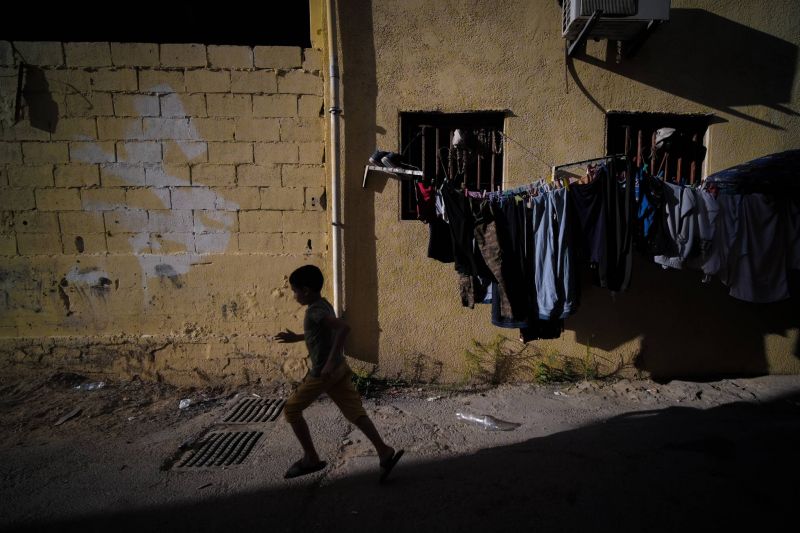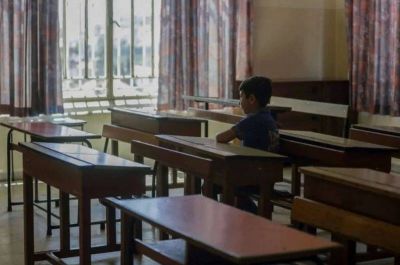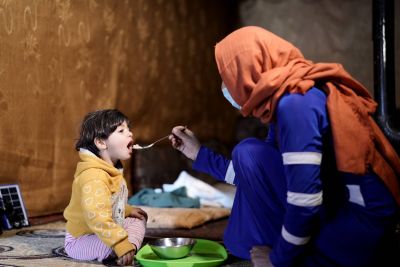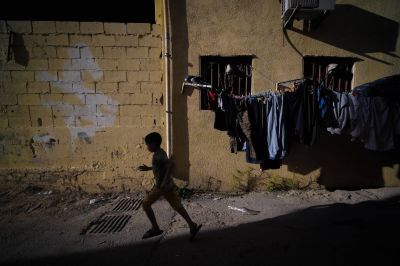
A child runs through the streets of Beirut. (Credit: João Sousa/L'Orient Today)
It is going to be a long night, for Issa*, 13, a blue cap on his head. “I’ve been roaming for hours, but no one gave me any money,” he says. It’s 8 p.m. at the start of the week, and the restaurants and bars on Armenia Street in Beirut’s Mar Mikhael neighborhood are already full.
Issa is with Ghazi, 12, who wears a Spider-Man T-shirt. The two Lebanese cousins walk alongside the cars, their hands outstretched and their eyes weary.
“I need a book for school, but it costs $15,” says Issa.
On the other side of the pavement, two Syrian brothers, Hamad and Ghiza, aged 9 and 12, try to sell their roses. Coffee in hand, dark circles under his eyes, Hamad says as he points at a woman huddled further down the street: “It’s for my mum.” From 5 p.m. to 2 a.m, they collect between LL1.5 and LL2 million [between $16 and $21], which they say they give to their mother.
“If I don’t manage to sell all my handkerchiefs, I’m not going home,” says Ilham, a 5-year-old girl. This little girl in pink sequined shoes says she doesn’t know her parents and came alone from Syria.
The shopkeepers on Armenia Street know them well. They’re always the same, say those interviewed by L'Orient-Le Jour, adding that the children always tell the same stories, possibly coached by their parents: a father handicapped by a back disc, the need to feed his family or go to school ….
‘I’m afraid it’ll turn into a business’
“You see, his parents are right over there,” says Hagop**, a barista at a popular café in the neighborhood. “They send him here because they know that our clientele is wealthy and will give money more easily to a child.”
Ilham comes out empty-handed, then wobbles towards Mohammad’s* mini-market, where the colorful sweets contrast with the dark street. This is where the little girl has got into the habit of buying her food.
“I’ve grown attached to her over the years,” says the shopkeeper.
Although begging is illegal in Lebanon (under Article 610 of the Penal Code), as is child labor since 2012, the state appears to continue to turn a blind eye to this issue, as seems the case with so many others in crisis-hit Lebanon.
The president of the Union for the Protection of Juveniles in Lebanon (UPEL), Amira Sukkar, said she fears that trafficking may be taking place: “I’m afraid that this is becoming a business. The children are too innocent to realize that there is manipulation somehow by the parents.”
In the absence of statistics, however, the exact number of child beggars in Lebanon is not known. The only clue is that, according to a UNICEF study dating from 2021, 12 percent of families surveyed reported having a working child.
During the period evaluated between 2019 and 2021, the UN organization noted that the number of Lebanese families who sent their children to work since the onset of Lebanon’s financial crisis in 2019 had increased seven times and that the number of Syrian children working had doubled, without providing any exact figures.
In 2016, the International Labor Organization (ILO) revealed that begging is the most prevailing form of child labor in Lebanon, with a rate of 43 percent.
“We intervene as soon as we are informed of the presence of a child. We carry out a social investigation to determine the children’s situation, then we try to get them into school and make sure they are healthy,” said UPEL’s Sukkar.
‘It breaks our hearts’
Back in Armenia Street, Hamad approaches the window of an ice cream maker, where he jabs at the four young people seated there. They all look away and there is an awkward silence. Then the conversation resumes. It is as if the child doesn’t exist. Hamad leaves and disappears.
At the same time, John* and his friend Amaury, two French tourists, come out of the ice cream shop. “By dint of seeing them in the street, one becomes indifferent,” John said.
“It’s very sad, it breaks our hearts. But we don't think that giving them money is really going to improve their lives,” Amaury added, before buying the little boy something to eat. “At least this way we can be sure that he will benefit directly.”
It’s nearly midnight and the nightlife in Mar Mikhael is still in full swing— just like the children who are forced to ask for money.
*The children’s family names have been withheld. First names have been changed to protect the anonymity of the interviewees.
**Some language in this article has been updated to better reflect L'Orient Today's editorial standards.
This article was originally published in French in L'Orient-Le Jour. Translation by Joelle El Khoury.


